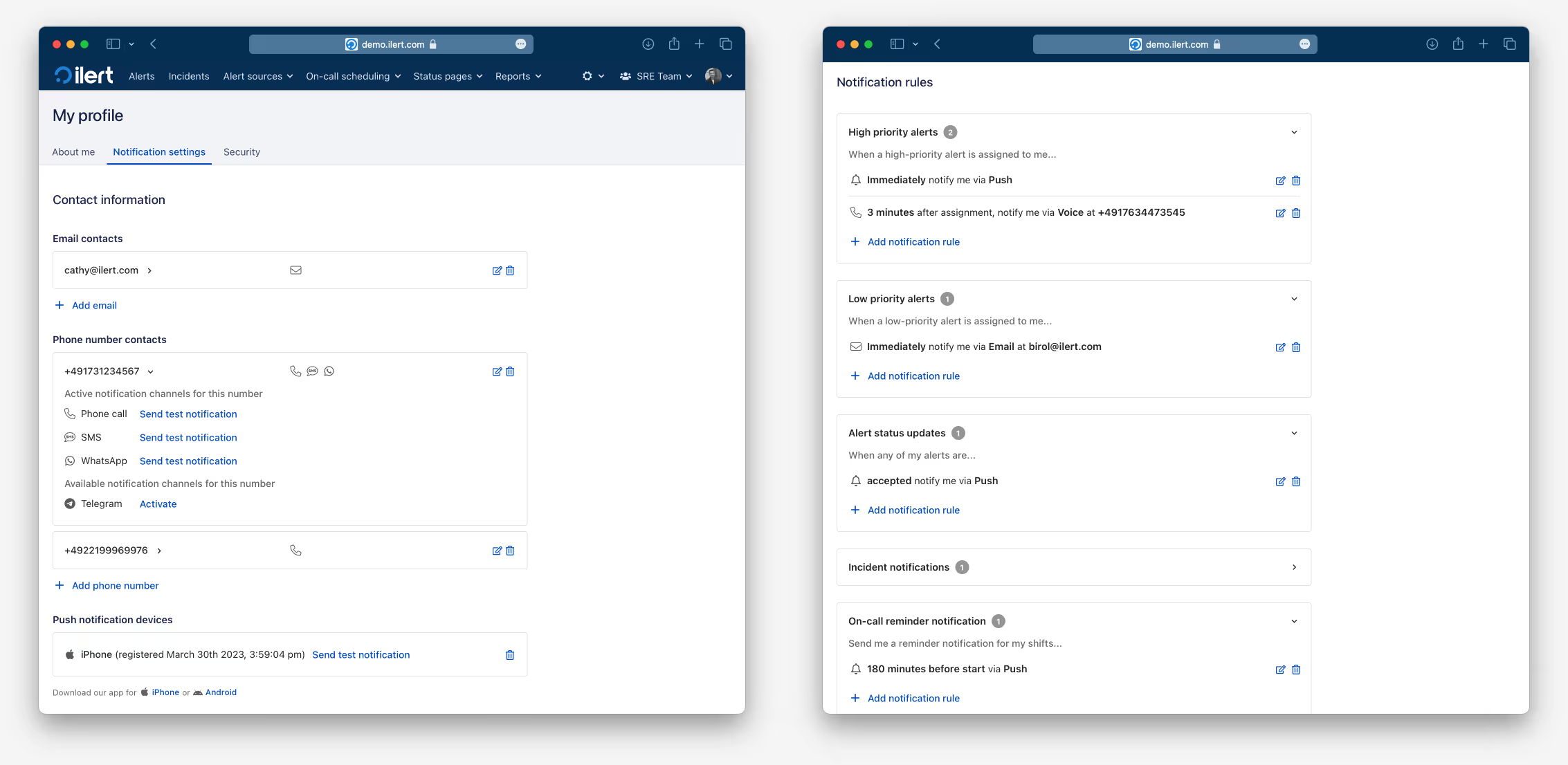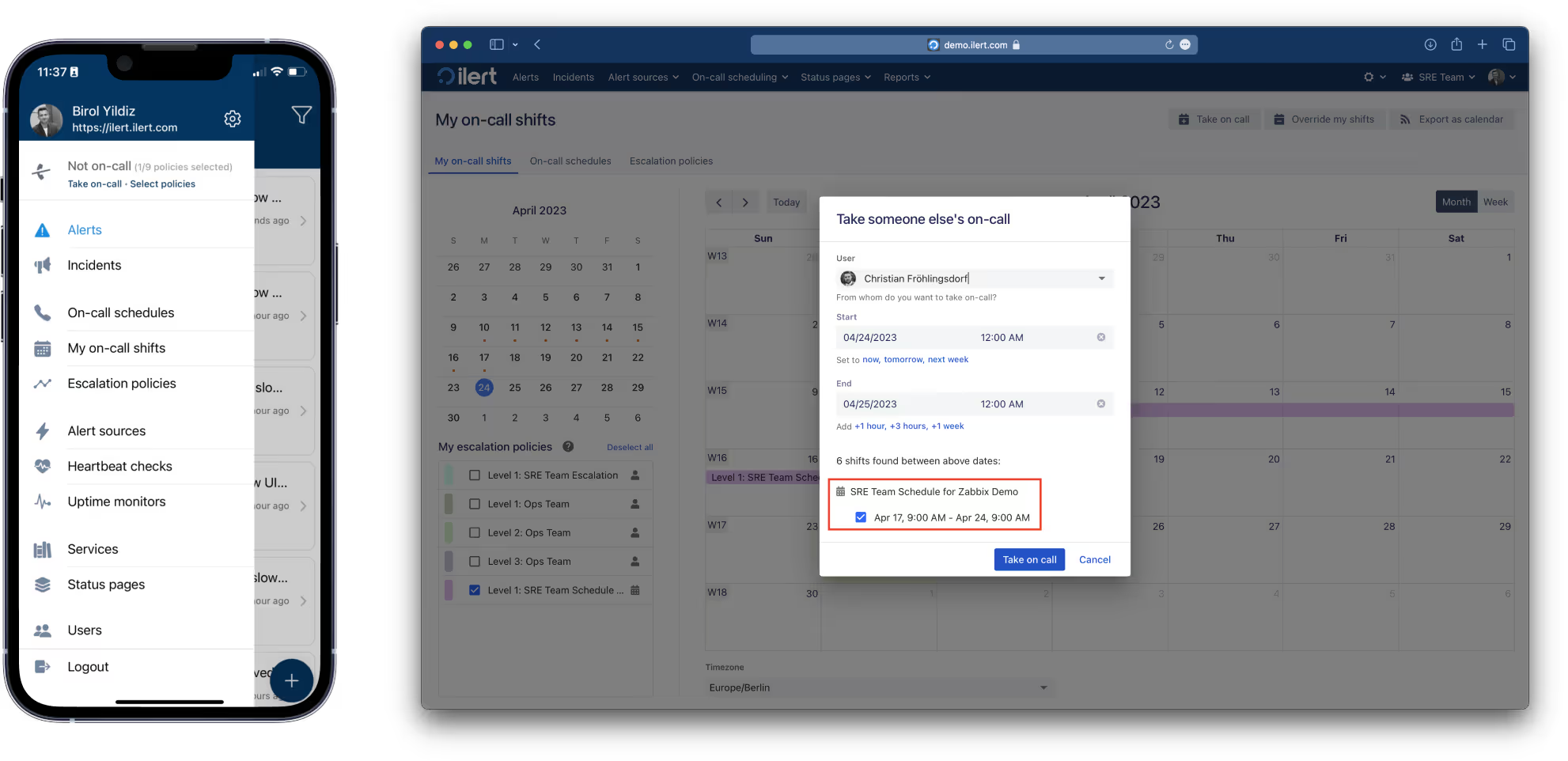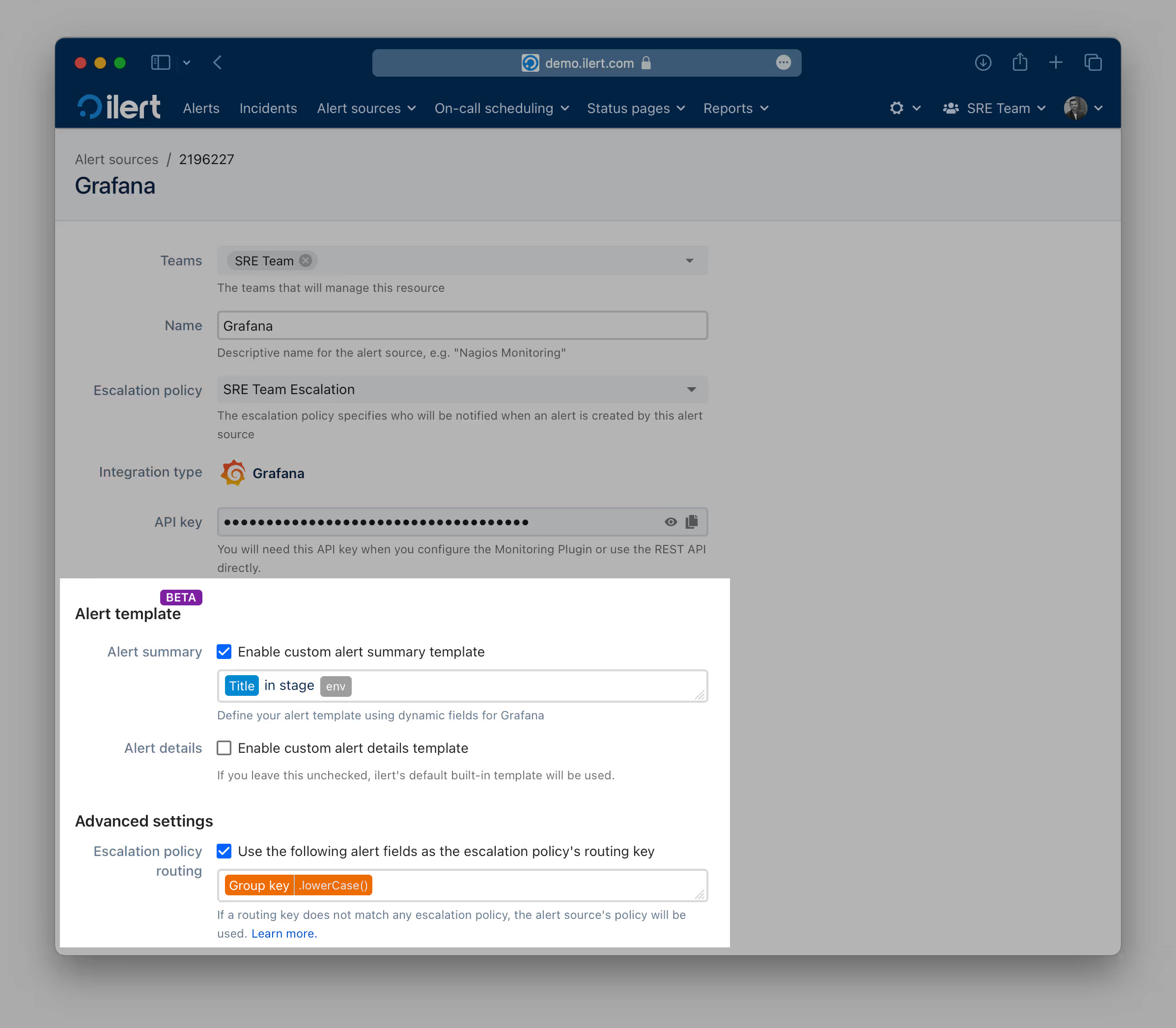New Features: Next-Generation Notifications UI, Take-On Call Widget, Alert Templates, Dynamic Policy Routing, Service Groups
This post highlights some of the features and improvements that we have released in the last two months. If you want to submit your own ideas or vote on existing feature requests, you can now use our public roadmap at roadmap.ilert.com.
Next-Generation Notifications UI: Streamlining Communication Across Channels
Notifications have always been at the core of ilert. Over a decade ago, our first iteration of the platform supported email and SMS notifications. Since then, we've expanded our offerings to include phone calls, mobile push, WhatsApp, and Telegram notification channels. As the number of channels grew, managing them became increasingly challenging due to varying activation flows and an outdated UI that was not designed to accommodate such an extensive array of options. Some of the previous UI's limitations included:
- Tying the notification email to your login email
- Restricting users to one notification email address and two phone numbers, with only one number available for SMS notifications
- Requiring the creation of an actual alert with proper escalation settings to test notifications
- An aging UI that was no longer efficient or visually appealing
Recognizing the need for a fresh start, we embarked on a major rebuild to elevate the user experience:
- Introducing a revamped notification settings UI, allowing users to input multiple email addresses and phone numbers while also reusing those contacts across various channels. For instance, your phone number can now be utilized for SMS, phone calls, WhatsApp, and Telegram.
- Implementing a consistent activation flow for each channel, simplifying the process of managing different notification methods.
- Enabling users to quickly test each channel with a single click, eliminating the need to create an alert for testing purposes.

Experience seamless communication with ilert's new Notifications UI, designed to enhance usability and provide a modern, user-friendly interface. Learn more about notification settings in our documentation.
Take-On Call Widget and Enhanced Overrides UX
In our continuous pursuit of refining the ilert experience, we identified an opportunity to improve the way users interact with overrides and on-call management. Our goals were to make overrides more accessible, streamline the process of taking over someone else's on-call duties, and provide a quick overview of on-call status within the mobile app.
In particular, we wanted to
- Enhance the discoverability of overrides, making it more convenient for users to manage their on-call schedules
- Allow users to swiftly take over someone else's on-call responsibilities when needed
- Enable users to easily view on-call status in the mobile app and take on-call shifts from colleagues
To achieve these goals, we're excited to unveil the following feature enhancements:
- New override shortcuts in the schedule list view: With just a few clicks, users can now access override options directly from the schedule list, increasing efficiency and simplifying the process of managing on-call shifts.
- Taking someone else's on-call in the "My On-Calls" view: Users can now easily assume responsibility for a colleague's on-call shift right from their personal on-call view, ensuring a seamless handover.
- Take on-call widget in the mobile app: A dedicated widget within the mobile app makes it simple to see the current on-call status and take over a colleague's on-call shift when necessary.
With these new features, ilert aims to deliver a more intuitive and user-friendly experience when managing on-call schedules and overrides. Enjoy a more efficient way of handling your on-call responsibilities with our improved Overrides UX and the Take-On Call Widget.

Alert Templates: Customize Your Alert Content for Greater Clarity
Understanding the importance of customizing alert information, we are excited to unveil our latest feature: Alert Templates. Tailor the summary and details of alerts to better suit your team's preferences and enhance their incident response capabilities.
Alert templates let you customize the summary and details of alerts to deliver critical information in a format that resonates with your team and provide powerful features:
- Leverage built-in and dynamic template variables from your monitoring tools to create custom alert content
- Apply functions to dynamic fields, such as converting a UNIX timestamp to a human-readable format
To get started with alert templates. navigate to Alert Sources and click on the Edit button for the alert source you wish to apply a template to. From there, you can create and customize your alert templates using the available variables and functions.

Learn more about alert templates in our documentation.
Dynamic Escalation Policy Routing: Intelligently Route Alerts to the Right Team
In our ongoing effort to provide a more adaptive and efficient incident management experience, we are excited to introduce a powerful new feature: Dynamic Escalation Policy Routing. This capability allows alerts to be routed to different teams based on the alert payload, rather than always using a predefined escalation policy and ensures that the right team members are notified and engaged in real-time, enhancing overall incident response.
Key Benefits of Dynamic Escalation Policy Routing:
- Route alerts to the appropriate teams based on the alert payload, ensuring targeted and effective communication
- Dynamically select the escalation policy to be used for an alert based on specific fields within the alert payload, enabling greater flexibility and adaptability in incident response
With Dynamic Escalation Policy Routing, ilert empowers teams to manage incidents more intelligently and efficiently. By routing alerts to the most relevant teams and dynamically selecting escalation policies based on alert payload information, your organization can benefit from faster, more focused incident response and resolution.

Learn more about Dynamic Escalation Policy Routing in our documentation.
Service Groups in Status Pages
Service Groups provide a convenient way to organize related services together on a status page, enabling users to quickly assess the overall health of a system and identify potential issues affecting multiple services.
Key Advantages of Service Groups:
- Group related services together on a status page for a consolidated view of system health
- Quickly identify issues impacting multiple services
A service group displays a combined status, uptime SLA and graph. Upon expansion, it reveals individual status and uptime graphs for each service.
Learn more about Service Groups.
Further improvements on status pages:
- Ever made a typo in an incident update? You can now update the history of an incident.
- Backfill incident: you can now add incidents to your status page that happened in the past.

More Improvements
- We have updated the list and detail view for escalation policies and alert sources to reflect our new UI style and added a few filters in the list views
- Responding to alerts via email now require a confirmation in the browser. This is to prevent from alerts being accepted automatically through email servers that automatically follow links
- Alert sources now self-document their integration features showing you at a glance whether an integration is bi-directional, supports backlinks or other integration features


















